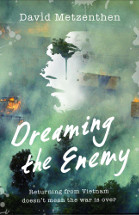Dreaming the enemy by David Metzenthen

Allen and Unwin, 2016. ISBN 9781760112257
(Age: 17+) Recommended. Good books are not always read for
entertainment. This book is nuanced and brilliantly crafted, but it
takes the reader into uncomfortable places and leaves you staggering
and in pain as you experience the aftermath of the Vietnam War. This
was not an enjoyable journey for the central character and survivor
Johnny Shoebridge, who struggles with PTSD. His tenuous grip on the
world is fraught with the painful dreams of conflict and the
memories of the shared experience with his war buddies. He carries
with him the ghosts of the traumatic experience and they claw at his
stability, leaving him reeling and wounded. Metzenthen has allowed
us also to experience the storyline from the perspective of the
North Vietnamese soldier, as Johnny weaves the story of his enemy
into his own nightmarish existence. The power of this dual
perspective of the Vietnam War and its impacts on the human
survivors - the 'feathers in the wind' tossed to the elements, is
visceral in opening up the tragedy of the Vietnam War for the
veterans who cannot escape the emotional storm that they carry with
them. Metzenthen has subtly and gently revealed the staggering
difficulty of returning to normality, particularly when strangers
(including World War II veterans) were quick to judge and malign the
returned servicemen without understanding their journey.
The writer's craft here is worthy of a recommendation. Metzenthen
has skilfully woven time twists and the different perspectives from
both sides of the conflict, as well as the psychological and
emotional torture of the PTSD sufferer as he attempts to find
'normal'. The empathy that he induces in the reader is powerful, but
it does require maturity in order to deal with the horrors of war
and the torment of the young man who carries the dreams and hopes of
his fallen buddies with him, as well as his own changed view of
self. I found this book emotionally difficult to read - it gave me
opportunity for understanding, but the pain of the central
character, and the immersion into war was devastating and extremely
distressing. Do not place this into the hands of a young reader
without assessing their ability to deal with the hard issues of war.
And although this gives perspective for ex-Servicemen's experience
across the years, it is also an insight into mental health issues.
(Note: some readers will also be confronted by the uncensored
language choices of the Aussie soldier in the midst of
life-threatening circumstances.)
Carolyn Hull